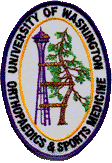Welcome to The UW Shoulder Site @ uwshoulder.com
Please note that information on this site was NOT authored by Dr. Frederic A Matsen III and has not been proofread or intended for general public use. Information was intended for internal use only and is a compilation for random notes and resources.
If you are looking for medical information about the treatment of shoulders, please visit shoulderarthritis.blogspot.com for an index of the many blog entries by Dr. Frederick A Matsen III.
Da Book
Standard Operating Procedures and Notes for the Shoulder Team
University of Washington Medical Center
Medicine Consult Service Triage List
We should see high risk patients if surgery is urgent with:
Unstable coronary syndromes
Decompensated CHF
Significant arrythmias (e.g. ventricular tachycardia)
Severe valvular disease
We should see patients with:
Symptomatic coronary disease
Prior MI
Compensated or prior CHF
Diabetes Mellitus-insulin dependent
Chronic kidney disease
History of stroke
Patients with coronary stents
Significant pulmonary hypertension
Low functional capacity and going for high-risk surgery
We should also see patients on warfarin (Coumadin) therapy if it is being taken for a pulmonary embolism or DVT within the past six months, or for a mechanical heart valve. (Feel free to call us about this if you have any questions).
Patients with these other conditions may be seen as space is available:
Significantly abnormal ECG (not trivial computer read abnormalities)
Rhythm other than sinus
Low functional capacity
Uncontrolled systemic hypertension (if truly uncontrolled and on multiple meds)
We usually do not need to see patients with none of the above conditions unless there are special circumstances that should be discussed with the consulting physician beforehand.
We want to serve you and your patients in the best possible way. The above evidence-based criteria will help to sort out which patients are most in need of medical consultation.
Draft revision 10/8/08
If you would like to look further into the actual need for a medicine consult per the ACC and AHA guideline, then please review the following article:
Major
Unstable coronary syndromes
- Acute or recent (within 1 month) myocardial infarction with evidence of important ischemic
risk by clinical symptoms or noninvasive study- Unstable or severe angina (Canadian class III or IV)
Decompensated heart failure
Significant arrhythmias
- High-grade atrioventricular block
- Symptomatic ventricular arrhythmias in the presence of underlying heart
disease- Supraventricular arrhythmias with uncontrolled ventricular rate
Severe valvular disease
Intermediate
Mild angina pectoris (Canadian class I or II)
Previous myocardial infarction by history or pathological Q waves
Compensated or prior heart failure
Diabetes mellitus (particularly insulin-dependent)
Renal insufficiency
Minor
Advanced age
Abnormal ECG (left ventricular hypertrophy, left bundle-branch block, ST-T
abnormalities)
Rhythm other than sinus (e.g., atrial fibrillation)
Low functional capacity (e.g., inability to climb one flight of stairs with a
bag of groceries)
History of stroke
Uncontrolled systemic hypertension
Most orthopedic surgeries are intermediate risk and arthroscopic may be considered low surgical risk.
Estimated Energy Requirements for Various Activities
1 MET Can you take care of yourself?
Eat, dress, or use the toilet?
Walk indoors around the house?
Walk a block or two on level ground at 2 to 3 mph or 3.2 to 4.8 km per h?4 METs Do light work around the house like dusting or washing dishes? Climb a flight of stairs or walk up a hill?
Walk on level ground at 4 mph or 6.4km per h?
Run a short distance?
Do heavy work around the house like scrubbing floors or lifting or moving heavy furniture?
Participate in moderate recreational activities like golf, bowling, dancing, doubles tennis, or throwing a baseball or football?
Greater than 10 METs Participate in strenuous sports like swimming,
singles tennis, football, basketball, or skiing?MET indicates metabolic equivalent.
Adapted from the Duke Activity Status Index and AHA Exercise Standards.



